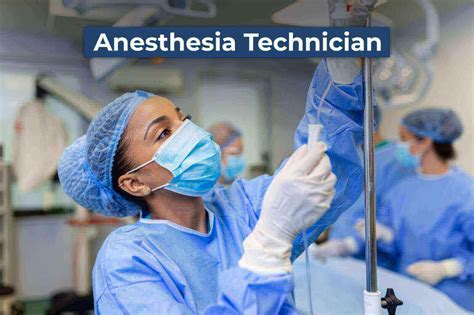As the healthcare industry continues to evolve, the demand for skilled anesthesia technicians is on the rise. With the increasing complexity of medical procedures and the growing need for specialized care, it's essential for hospitals, clinics, and medical facilities to find top talent in the field. In this article, we'll provide expert tips for hiring the best anesthesia technicians, ensuring that your facility has the skilled professionals it needs to deliver exceptional patient care.
Understanding the Role of Anesthesia Technicians
Before we dive into the hiring process, it's essential to understand the critical role that anesthesia technicians play in the medical field. Anesthesia technicians, also known as anesthesia technologists or certified anesthesia technicians (Cer.A.T.), are skilled healthcare professionals who work under the supervision of anesthesiologists and certified registered nurse anesthetists (CRNAs). Their primary responsibility is to prepare and maintain the equipment and supplies needed for anesthesia care, ensuring that patients receive safe and effective treatment.

Key Responsibilities of Anesthesia Technicians
- Prepare and maintain anesthesia equipment and supplies
- Assist anesthesiologists and CRNAs during medical procedures
- Monitor patient vital signs and report any changes or concerns
- Maintain accurate records and documentation
- Collaborate with other healthcare professionals to ensure seamless patient care
Essential Skills and Qualifications for Anesthesia Technicians
When hiring anesthesia technicians, there are several essential skills and qualifications to look for:
- Certification: Look for certification from the American Society of Anesthesia Technologists and Technicians (ASATT) or the National Certification Examination for Anesthesia Technicians (NCEAT).
- Education: A post-secondary certificate or degree in anesthesia technology or a related field is highly desirable.
- Clinical experience: Prior experience working in an operating room or healthcare setting is essential.
- Communication skills: Strong communication and interpersonal skills are critical for effective collaboration with healthcare teams and patient care.
- Attention to detail: Anesthesia technicians must be meticulous and detail-oriented when preparing equipment and supplies.

Soft Skills for Success
In addition to technical skills and qualifications, there are several soft skills that are essential for success as an anesthesia technician:
- Teamwork: Anesthesia technicians must be able to work effectively with other healthcare professionals, including anesthesiologists, CRNAs, and nurses.
- Adaptability: The ability to adapt to changing situations and priorities is critical in a fast-paced healthcare environment.
- Time management: Anesthesia technicians must be able to manage their time effectively, ensuring that equipment and supplies are prepared and ready for use.
- Problem-solving: Strong problem-solving skills are essential for troubleshooting equipment issues and responding to unexpected situations.
Recruitment Strategies for Top Talent
To attract top talent in anesthesia technology, consider the following recruitment strategies:
- Social media: Utilize social media platforms, such as LinkedIn and Facebook, to post job openings and connect with potential candidates.
- Professional associations: Partner with professional associations, such as the ASATT, to reach a targeted audience of anesthesia technicians.
- Employee referrals: Encourage current employees to refer friends and colleagues who may be interested in anesthesia technology positions.
- Job fairs: Attend job fairs and healthcare industry events to connect with potential candidates and showcase your facility's opportunities.

Interview Questions for Anesthesia Technicians
When interviewing anesthesia technician candidates, consider asking the following questions:
- What inspired you to pursue a career in anesthesia technology?
- Can you describe a time when you had to troubleshoot equipment issues during a medical procedure?
- How do you prioritize tasks and manage your time in a fast-paced healthcare environment?
- Can you provide an example of a time when you had to communicate complex information to a patient or healthcare team member?
Retention Strategies for Anesthesia Technicians
To retain top talent in anesthesia technology, consider the following strategies:
- Professional development opportunities: Offer ongoing education and training opportunities to help anesthesia technicians advance their skills and knowledge.
- Competitive compensation and benefits: Provide competitive compensation and benefits packages to attract and retain top talent.
- Recognition and reward: Recognize and reward anesthesia technicians for their contributions to patient care and the healthcare team.
- Positive work environment: Foster a positive work environment that promotes collaboration, respect, and open communication.

Conclusion
Hiring top talent in anesthesia technology requires a strategic approach that takes into account the unique needs and requirements of this critical role. By understanding the key responsibilities, essential skills, and qualifications of anesthesia technicians, healthcare facilities can attract and retain the best professionals in the field. Remember to utilize effective recruitment strategies, ask the right interview questions, and implement retention strategies to ensure that your facility has the skilled anesthesia technicians it needs to deliver exceptional patient care.





What is the role of an anesthesia technician?
+Anesthesia technicians are skilled healthcare professionals who work under the supervision of anesthesiologists and certified registered nurse anesthetists (CRNAs) to prepare and maintain the equipment and supplies needed for anesthesia care.
What qualifications do I need to become an anesthesia technician?
+To become an anesthesia technician, you typically need a post-secondary certificate or degree in anesthesia technology or a related field, as well as certification from the American Society of Anesthesia Technologists and Technicians (ASATT) or the National Certification Examination for Anesthesia Technicians (NCEAT).
What are the essential skills for an anesthesia technician?
+Essential skills for anesthesia technicians include attention to detail, strong communication and interpersonal skills, the ability to work effectively in a team environment, and the ability to prioritize tasks and manage time effectively.
